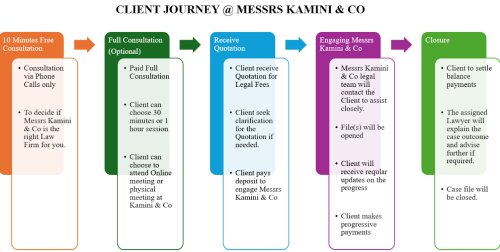Best Child Visitation Lawyers in Subang Jaya
Share your needs with us, get contacted by law firms.
Free. Takes 2 min.
Free Guide to Hiring a Family Lawyer
List of the best lawyers in Subang Jaya, Malaysia
About Child Visitation Law in Subang Jaya, Malaysia:
Child visitation refers to the legal right of a parent to spend time with their child who does not reside with them on a regular basis. In Subang Jaya, Malaysia, child visitation laws are governed by the Guardianship of Infants Act 1961 and other relevant family laws. These laws aim to protect the best interests of the child while ensuring that both parents have the opportunity to maintain a meaningful relationship with their child.
Why You May Need a Lawyer:
There are several situations where you may need the assistance of a lawyer in matters concerning child visitation. These include disputes over visitation schedules, disagreements between parents regarding visitation rights, violations of court-ordered visitation arrangements, and any other legal issues that may arise in relation to child visitation.
Local Laws Overview:
In Subang Jaya, Malaysia, the court considers the best interests of the child when making decisions about child visitation. Factors such as the child's age, health, and emotional needs are taken into account. The court may also consider the wishes of the child, if they are old enough to express a preference. It is important to note that both parents have a legal right to maintain a relationship with their child, and the court will strive to ensure that both parents have access to the child unless there are valid reasons to restrict visitation.
Frequently Asked Questions:
1. Can a parent deny visitation rights to the other parent?
Under normal circumstances, a parent cannot deny visitation rights to the other parent without a valid reason. If there are concerns about the child's safety or well-being during visitation, it is advisable to seek legal advice before taking any action.
2. Can grandparents request visitation rights?
Grandparents may request visitation rights in certain circumstances, such as when it is in the best interests of the child to maintain a relationship with their grandparents. However, the court will consider various factors before granting such rights.
3. What should I do if the other parent is not complying with the visitation schedule?
If the other parent is not complying with the court-ordered visitation schedule, you may need to seek legal assistance to enforce the visitation rights. A lawyer can help you navigate the legal process and ensure that your rights are upheld.
4. Can visitation rights be modified?
Visitation rights can be modified if there is a significant change in circumstances that necessitates a revision of the existing visitation arrangement. This typically requires a court order, and it is advisable to seek legal advice before making any changes.
5. How can I establish visitation rights as a non-custodial parent?
If you are a non-custodial parent seeking visitation rights, you can file a petition with the court to establish a visitation schedule. It is recommended to seek legal advice to ensure that your rights are protected during this process.
6. What factors does the court consider when determining visitation rights?
The court considers various factors when determining visitation rights, including the child's best interests, the relationship between the child and each parent, the child's preferences (if applicable), and any history of abuse or neglect. The court will strive to create a visitation schedule that promotes the child's well-being.
7. Can visitation rights be restricted in cases of abuse or neglect?
If there are concerns about abuse or neglect during visitation, the court may restrict or suspend visitation rights to protect the child's safety. It is important to report any instances of abuse or neglect to the relevant authorities and seek legal advice to address the situation appropriately.
8. Can visitation rights be enforced if the other parent refuses to comply?
If the other parent refuses to comply with the court-ordered visitation schedule, you can seek legal assistance to enforce the visitation rights. This may involve filing a motion with the court to hold the non-compliant parent in contempt or seeking other legal remedies to ensure that your rights are upheld.
9. What should I do if I have concerns about the child's safety during visitation?
If you have concerns about the child's safety during visitation, it is important to address these concerns promptly. You may need to seek legal advice to explore options for modifying the visitation arrangement or ensuring that the child's well-being is protected. Reporting any instances of abuse or neglect is also crucial in these situations.
10. How can I navigate the legal process for child visitation in Subang Jaya, Malaysia?
If you require legal assistance with child visitation matters in Subang Jaya, Malaysia, it is recommended to consult with a family law attorney who is familiar with the local laws and procedures. A lawyer can help you understand your rights, navigate the legal process, and advocate for your interests in court, if necessary.
Additional Resources:
For additional resources and support related to child visitation in Subang Jaya, Malaysia, you may consider reaching out to the Family Court, the Social Welfare Department, or local family law organizations. These entities may provide guidance, information, or assistance with child visitation matters.
Next Steps:
If you are in need of legal assistance with child visitation in Subang Jaya, Malaysia, it is advisable to schedule a consultation with a family law attorney. During the consultation, you can discuss your concerns, review your rights and options, and determine the best course of action to address your child visitation issues effectively. Remember that seeking legal advice early can help you protect your rights and ensure the well-being of your child.
Lawzana helps you find the best lawyers and law firms in Subang Jaya through a curated and pre-screened list of qualified legal professionals. Our platform offers rankings and detailed profiles of attorneys and law firms, allowing you to compare based on practice areas, including Child Visitation, experience, and client feedback.
Each profile includes a description of the firm's areas of practice, client reviews, team members and partners, year of establishment, spoken languages, office locations, contact information, social media presence, and any published articles or resources. Most firms on our platform speak English and are experienced in both local and international legal matters.
Get a quote from top-rated law firms in Subang Jaya, Malaysia — quickly, securely, and without unnecessary hassle.
Disclaimer:
The information provided on this page is for general informational purposes only and does not constitute legal advice. While we strive to ensure the accuracy and relevance of the content, legal information may change over time, and interpretations of the law can vary. You should always consult with a qualified legal professional for advice specific to your situation.
We disclaim all liability for actions taken or not taken based on the content of this page. If you believe any information is incorrect or outdated, please contact us, and we will review and update it where appropriate.









